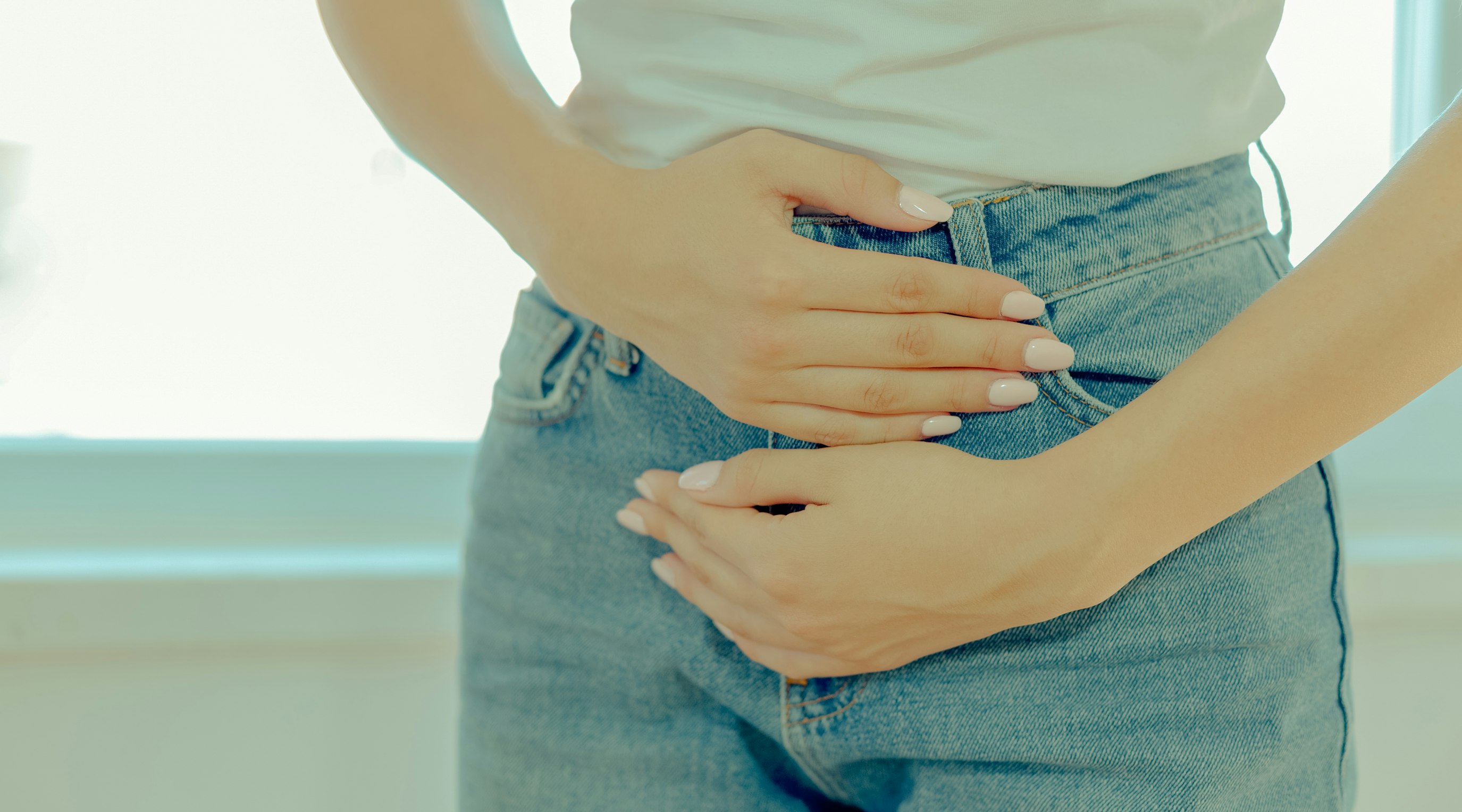Can CBD oil help interstitial cystitis?
12 min read
Kerry Charron
CBD oil for interstitial cystitis pain
Cannabidiol, or CBD, has gained popularity in recent years for its potential health benefits. This natural compound, produced by Cannabis sativa L. plants, has been touted as a treatment for various conditions, including chronic pain. One condition that CBD may be able to help with is interstitial cystitis (IC).3
Contents
Interstitial cystitis explained
Interstitial cystitis (IC) is an excruciating chronic condition that is characterised by irritation of, or damage to, the bladder wall. According to NHS Digital, there were 330,000 admissions to hospital, indicating patient complaints of urinary-related problems associated with IC.
IC is a condition that is often discussed along with Painful Bladder Syndrome (PBS), because the two conditions share similar symptoms. These include:
- urinary urgency
- urinary frequency
- pain in the urinary bladder region
The main difference between the two conditions is that IC patients have cystoscopic (lesion or ulcer-like) areas on the bladder wall in addition to the PBS symptoms. Both cause, in some cases, overwhelming bladder pain.
PBS is diagnosed when a patient experiences persistent or recurrent pain in the urinary bladder region and at least one other symptom. Some examples include increased pain when the bladder is fuller, and more urinary frequency at specific times of the day or night.
There is no known cause. IC is typically associated with negative cognitive, behavioural, or emotional consequences attributed to symptoms affecting the lower urinary tract as well as sexual dysfunction.
This specific bladder pain disorder impacts more women than men. About 14 million UK residents live with IC. Many patients describe IC’s negative impact on quality of life. Fatigue, anxiety, and depression can accompany the pain. IC may flare up due to stress, hormone changes, diet, and other factors.
Interstitial cystitis symptoms
Interstitial cystitis symptoms are different for each patient, but the most common symptoms include the following:
- Moderate to severe pelvic area pain
- Sudden, intense urges to urinate
- Sleep disruption due to urges to urinate
- More frequent and stronger urges to urinate than normal
So, does CBD for interstitial cystitis pain have a role to play in treating this condition? Let's have a look at the evidence.
Traditional treatment options for IC
Conventional IC treatments include orally administered pain medication, physical therapy, nerve stimulation, bladder distension, and (in rare cases) surgery.
Traditional bladder pain medications are often prescribed to interstitial cystitis patients. These include over-the-counter painkillers such as paracetamol, nerve pain medication, non-steroidal anti-inflammatory drugs, and even certain antidepressants.
Other treatment components may include biofeedback, diet-based therapies, herbal remedies, massage, and meditation practices. Complementary and alternative medicine therapies are increasingly incorporating plant-based medicine, including CBD oil.
What is CBD Oil?
CBD oil is an extract of the hemp (or cannabis) plant, which contains high levels of cannabidiol (CBD). CBD oil can come in many forms, but there are three main types of CBD oil:
- Full-spectrum CBD products contain the entire range of cannabinoids, terpenes, and flavonoids found in the source plant. As CBD oil is most typically sourced from hemp plants containing minuscule amounts of THC, the THC levels in full-spectrum CBD products will also be minimal.
- Broad-spectrum CBD products contain all the cannabinoids except THC, which has been completely removed.
- Isolate CBD products contain only CBD. This means that all other cannabinoids, flavonoids and terpenes have been removed from the product.
Here in the UK, CBD products containing less than 0.2% THC are legal for over-the-counter sale, meaning that anyone can legally buy CBD oil without a prescription. One pertinent point to be aware of is that over-the-counter CBD options are subject to less stringent regulatory oversight than medicinal, prescribable CBD options.
Another interesting point, or theory (to be more precise), to be aware of is the "entourage effect”.
What is the entourage effect?
Simply put, the entourage effect refers to the synergistic effect of the various compounds found in cannabis, specifically the cannabinoids, terpenes, and even possibly the flavonoids. When these compounds are offered together in a single CBD oil, they may work together to enhance the therapeutic benefits of CBD. Certain terpenes have also been found to offer health benefits on their own, but when combined with CBD, these benefits may be synergistically enhanced.
CBD oil benefits are wide-ranging. CBD oil is widely believed to promote relaxation, reduce anxiety levels, and offer huge anti-inflammatory advantages. CBD (and all medical cannabis products) should be seen as one part of a holistic treatment regime, and never as some kind of "magic cure-all". Recent research has shown that CBD oil is generally safe and potentially effective for managing pain, anxiety, and many other complaints.
How CBD Oil Works
To understand CBD oil mechanism of action, including pain level reduction, we need to first discuss the body's endocannabinoid system (ECS).
The endocannabinoid system
The endocannabinoid system is a complex network of receptors (CB1 and CB2), neurotransmitters (endocannabinoids), and enzymes that help the body maintain homeostasis or balance. This system is interconnected with various other physiological pathways and plays an important role in many bodily processes. It is now thought to work as the “master regulator” of the body's entire system.
CBD and other cannabinoids fit into these receptors like a key in a lock, activating them to produce various effects. CBD can bind with CB1 and CB2 receptors, but the exact mechanism of action is complex due to the extensive number of pathways involved in this type of reaction. It has also been shown to reduce the rate of enzymatic breakdown of our endocannabinoid, anandamide (AEA). This allows AEA to persist in the system for longer, amplifying its effects.
Can CBD oil help interstitial cystitis?
It is thought that CBD oil may help reduce the inflammation and pain associated with IC and PBS. In addition, it may also reduce the pain associated with bladder spasms, which are common symptoms of both conditions. CBD's anti-inflammatory and pain-reducing properties have been investigated in numerous studies.
While the research directly relating to CBD and its effectiveness in reducing the symptoms of interstitial cystitis is somewhat lacking, there is one study that we can reference.
“Cannabidiol as a Promising Therapeutic Option in IC/BPS: In Vitro Evaluation of Its Protective Effects against Inflammation and Oxidative Stress”, which was published in March 2023, looked into the potential effect of CBD in alleviating the symptoms of interstitial cystitis. If found that CBD treatment of urothelial cells significantly decreased TNFα-upregulated mRNA, which in turn resulted in the huge potential for the reduction of symptoms.
And, although there may not be a bunch of specific IC/CBD research to pull from, the more general research into CBD and its ability to act as an anti-inflammatory and pain reliever is widely available.
What does this mean, exactly?
CBD has beneficial pharmacological effects, including anti-inflammatory and antioxidant properties, and has therapeutic potential for many diseases associated with oxidative stress.
Another showed that topical CBD reduces inflammation and pain-related behaviours, and one more study looked into CBD effects on TRPV1 Signalling Pathways, with a specific focus on pain reduction.
Sleep problems and anxiety are common issues that go hand in hand with many health complaints, and this is true for sufferers of interstitial cystitis. The pain and the need to urinate can have a devastating effect on sleep patterns, which often leads to anxiety surrounding the idea of sleep. “Cannabidiol in Anxiety and Sleep: A Large Case Series” offers great insight into how effective CBD is in potentially alleviating much of this anxiety, while also acting as a powerful sleep aid.
All of this evidence points to the potential of CBD as a therapeutic agent in the reduction of IC symptoms. With more research being conducted all the time, hopefully, we will have a clearer understanding of the exact mechanisms behind the health potential of CBD, but for now, it's safe to say that it holds great potential.
Medical professionals anticipate that CBD will play a predominant role in future chronic bladder pain treatments.
How to take CBD oil for interstitial cystitis
There is a multitude of ways that CBD oil can be administered. From topical creams to sublingual (under the tongue) drops, and even in a wide range of pre-dosed edibles, the world of CBD is certainly an interesting one.
Guidance on taking CBD oil for interstitial cystitis relief
But, before you make any decisions regarding your treatment plan, we heavily recommend seeking the advice of a doctor who is both registered and experienced in prescribing medicinal cannabis.
Sure, you could just head out to your closest health food store and grab a bottle of CBD oil, but for the best chance at symptomatic reduction of interstitial cystitis, it's best to understand all the potential options available to you.
As we mentioned above, the consumer CBD oil market, while regulated, is less so than the medicinal sector. The products prescribed by doctors are subject to more rigorous testing, and the dosages are much more accurately prescribed.
When it comes to CBD dosing for treating interstitial cystitis, there is, unfortunately, no definitive answer. Every person's body works differently, and everyone responds to different dosages in varying ways. Again, a doctor will be able to best guide you in dosing CBD oil.
With that said, sublingual CBD drops are becoming an increasingly popular option for IC sufferers, as this method of administering CBD oil offers rapid relief. Simply place a few drops under your tongue and hold them there for 30 seconds to a minute before swallowing.
Potential side effects
CBD oil side effects, such as dizziness, nausea and grogginess, can be at least somewhat common, but most patients report that they are mild and easily resolved when administration is tapered off or stopped.
It is also possible that CBD oil and some medications will interact negatively, so consult your prescribing physician about dosing concerns and potential interactions, especially if you are taking prescribed pharmaceuticals.
CBD oil for interstitial cystitis FAQs
Can CBD oil help bladder inflammation?
Although the amount of targeted research into CBD and its effectiveness in reducing the symptoms of interstitial cystitis is limited, there have been multiple studies showing that it has anti-inflammatory properties. As such, it may be able to help reduce the rates of bladder wall inflammation and associated pain.
Is CBD oil legal?
CBD oil that contains less than 0.2% of the psychoactive component (THC) is legal for 'over-the-counter' here in the UK. If you need access to CBD oil options that contain more than 0.2% THC, it must be prescribed by a specialist.
What is the best way to take CBD oil?
That depends on your personal preference and the severity of your symptoms. Vaporisation and sublingual drops are both popular for their rapid relief, while topical creams can provide targeted pain relief to specific areas. When administered in edible form, the onset of effects can take anywhere between 30 and 90 minutes, but the effects will also last longer than with other administration methods, up to 6 to 8 hours.
Is CBD oil safe?
According to multiple studies, CBD oil is generally very safe for humans. However, as with any supplement or medication, side effects may occur for some individuals. It is always best to consult with a doctor before starting any new treatment plan.
Conclusion
Emerging data points to CBD oil's efficacy and safety in managing interstitial cystitis symptoms. As with most medicinal cannabis research, thanks to the almost century-long prohibition on cannabis, there is still much to learn. The best way to ensure the safety of your CBD oil use for IC treatment is to consult with a doctor who is knowledgeable in medicinal cannabis and has experience with treating IC patients.
Releaf understands the importance of medical cannabis in treating various medical conditions. With our tailored monthly packages, specialist consultations for medical cannabis, and a unique medical cannabis card for protection, you can access the treatment you need without worrying about the stigma.
To learn more, check out our extensive blog and education section.
Share article
Did you like this article?
It is important to seek medical advice before starting any new treatments. The patient advisors at Releaf are available to provide expert advice and support. Alternatively, click here to book a consultation with one of our specialist doctors.
Elevate your wellness with medical cannabis
Get comprehensive care, convenience, and confidence with an all-in-one treatment plan.
Am I eligible?Authors
Kerry, with experience as a medicinal cannabis cultivation technician and expertise in business licensing applications, is passionate about developing educational content and advocating for better access to medical cannabis worldwide.
meet our specialist
Editorial Policy
All of our articles are written by medical cannabis experts, guided by strict sourcing guidelines, and reference peer-reviewed studies and credible academic research. Our expert clinical team and compliance specialists provide valuable insights to ensure accuracy when required. Learn more in our editorial policy.
Need more help?











